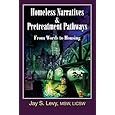
“Homeless Narratives & Pretreatment Pathways: From Words to Housing”
Author: Jay S. Levy, MSW, LICSW
I just finished reading “Homeless Narratives & Pretreatment Pathways: From Words to Housing” by Jay S. Levy, MSW, LICSW. Overall I found it to be a wonderful book. It is extremely well thought out plus it is laid out in an easy-to-follow and easy-to-understand manner. I liked that it was written in such a way that even those of us who don’t have a degree in Social Work can still understand it. I definitely appreciated hearing the author’s perspective because he actually has extensive first-hand experience from working on the streets and with shelters in New York City, Boston and western Massachusetts. And finally, I liked the fact that he included real experiences and shared moving stories like Old Man Ray, Tracy or Andrew in “Homeless Narratives & Pretreatment Pathways.”
“Homeless Narratives & Pretreatment Pathways” is a book that gives us a peek into the real world of homelessness. Throughout its pages Levy has deftly intertwined true story with theory and practice. He shows us how each individual person and his or her situation is different. He explains how some homeless people can, and do, suffer from untreated mental illness, addiction, and other medical conditions which ultimately lead to a steady deterioration of their health. Many of us have probably wondered at one time or another why homeless people would prefer to live on the street rather than seek help. In “Homeless Narratives & Pretreatment Pathways” Levy uses his personal experiences and stories from homeless people he has worked with during the years to help answer that question. Needless to say while I found “Homeless Narratives & Pretreatment Pathways” to be an eye-opening read; I also found its accompanying statistics to be very sobering.
All in all I would say that Levy did a fantastic job writing “Homeless Narratives & Pretreatment Pathways.” Anyone who reads this will come away with a fresh perspective and hopefully a little more respect for those who are unfortunate enough to have to live on the street. A “must read” for everyone but especially for those looking to have a career in any type of social work or outreach program.
